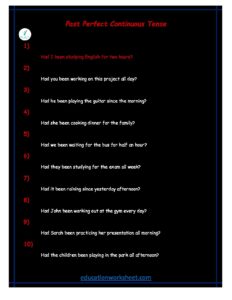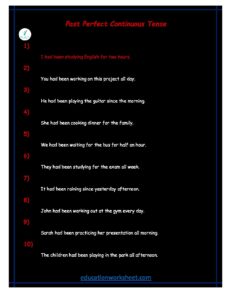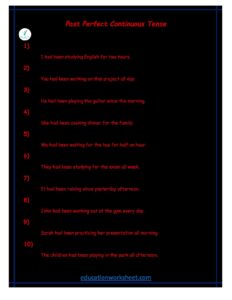how to converting Past Continuous Tense interrogative sentences to negative form
how to converting Past Continuous Tense interrogative sentences to negative form
In English grammar, the Past Continuous Tense is used to describe actions or events that were ongoing in the past. Interrogative sentences in the Past Continuous Tense are used to ask questions about these ongoing actions. To convert Past Continuous Tense interrogative sentences into negative form, you need to follow a specific set of rules and structures. In this guide, we will explore the step-by-step process of changing interrogative sentences in the Past Continuous Tense into negative sentences.
Identify the Interrogative Sentence: Begin by identifying the interrogative sentence in the Past Continuous Tense that you want to convert into a negative sentence. An example interrogative sentence is: “Were you studying last night?”
Locate the Helping Verb: In Past Continuous Tense interrogative sentences, the helping verb “was” or “were” is used to form questions. In our example sentence, “were” is the helping verb.
how to converting Past Continuous Tense interrogative sentences to negative form

Remove the Helping Verb: To convert the interrogative sentence into a negative one, you should remove the helping verb. For our example sentence, it becomes: “You studying last night?”
Add “Not”: Insert the word “not” after the subject of the sentence. So, our sentence becomes: “You were not studying last night?”
Rearrange the Words: In English, the standard word order for negative sentences in the Past Continuous Tense is subject + “was/were not” + verb in the base form + rest of the sentence. Rearrange the sentence accordingly: “You were not studying last night?”
Punctuation: Make sure to include the appropriate punctuation marks, such as the question mark at the end of the sentence to indicate that it was originally a question. In this case, it remains the same: “You were not studying last night?”
Optional: Contract the Negative Form: In spoken and informal written English, you can contract “were not” to “weren’t” for the plural form. The sentence then becomes: “You weren’t studying last night?”
how to converting Past Continuous Tense interrogative sentences to negative form

Correct the Subject-Verb Agreement: Ensure that the verb agrees with the subject in terms of number (singular or plural). In our example sentence, “You” is the subject, and “were” is the appropriate form of the verb.
Maintain Time References: Keep in mind that when converting a question to a negative sentence, you should maintain the same time references as in the original question. In our example, “last night” remains in the negative form: “You weren’t studying last night?”
Practice and Review: To become proficient in converting Past Continuous Tense interrogative sentences to negative form, practice with different examples and review the rules and structures until you are comfortable with the process.
how to converting Past Continuous Tense interrogative sentences to negative form

In summary, converting Past Continuous Tense interrogative sentences to negative form involves removing the helping verb, adding “not,” rearranging the words, and ensuring subject-verb agreement. By following these steps, you can effectively transform questions about past ongoing actions into negative statements.

